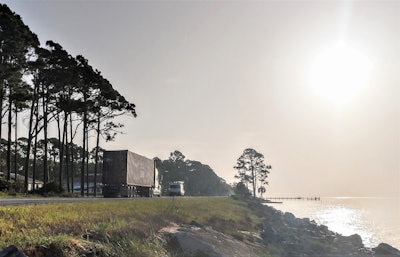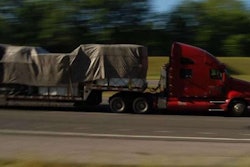
Have y’all gotten sick of election news yet? He said, she said, he said … back and forth day after day. It is enough to drive you crazy if you watch the news all the time. Thankfully, I most often just get a quick news report via trucking-focused satellite radio and then on to other topics I may actually have an ability to change, or at least make a real difference in. Which brings me to this one.
The Owner-Operator Independent Drivers Association has requested its members to be a voice in the conversation around a proposed defining of “independent contractor” at the federal level. The Department of Labor put out the potential criteria in September, but I guess I missed it because I only heard about it last week. (Quite possibly I tuned it out because of all the election malarkey.)
From what I can tell, the proposed methods of definition are pretty well-thought-out for a change, but I wonder how others feel.
To me, attempting to define something in business can be a monumental task, considering the diversity of operations all around, not to mention the diversity in trucking itself. What makes someone an owner-operator? Notice I did not say independent contractor. An owner-operator may fall under such a classification. But owner-operator can refer to a variety of entities itself, from an independent carrier to an owner/lease contractor and lease-purchase contractor.

My own definitions, here:
The owner/lease contractor owns the equipment outright (or in a financing contract with a bank or working directly with a leasing company) and leases it to a company as a contract operator. They are paid under a contract agreement. They have complete responsibility for all repairs and operation of the equipment (per contract agreement). They cannot, however, haul freight for other companies or brokers that the company they are leased to do not have an agreement with.
A lease-purchase contractor is buying their equipment through the carrier they’re contracting with instead of another entity, but they are no less responsible than the owner/lease contractor and generally have a similar contract for operation. One major difference is if the lease-purchase contractor finds their work environment unacceptable, they cannot simply take their truck and move to another company. Many lease-purchases are “walk-away” in nature, meaning if the driver so chooses they can walk away, losing everything they have already put into their equipment purchase.
There are predatory companies who cycle drivers through their programs for this very reason. It’s something I personally feel needs to be stopped. Perhaps better defining independent contractor criteria may help in that, but I digress. …
An independent carrier owner-operator is a completely different entity. These men and women have their own operating authority and find their own freight through whatever legal means works best for their company. But they have 100% control and 100% responsibility for all cost, liability and record-keeping. They may be buying their equipment through a bank or leasing it through a leasing company, but it is all their responsibility and under their control. For freight, they work under contracts with all manner of shippers or through the brokers or other intermediaries.
Are owner/lease or lease-purchase contractors any less of an entrepreneur? I wouldn’t say that. They have simply chosen a business model that works best for them and gives them a measure of independence. According to dictionary definitions, an entrepreneur is a person who organizes and manages any enterprise, especially a business, usually with considerable initiative and risk.
By this definition alone, all who fall under the owner-operator label are entrepreneurs. While some take on greater levels of risk than others, does that make them any less of a business? Again, they have chosen a model that works best for them.
How do we define contractors, then (notice I did not say independent)? The Department of Labor has proposed to, in the words of the coverage of the proposal here at Overdrive, use “five economic-reality factors,” consolidating some factors currently in use and “changing the weight of others.” Here’s the breakdown of those factors, as my colleagues reported:
- Nature and degree of the worker’s control over the work. Substantial control weighs toward independent contractors, with less control pointing in the opposite direction.
- Opportunity for profit or loss. Does the employee/contractor have “an opportunity to earn profits or incur losses” in his operation? Both being present weighs toward independent contractor. The NPRM would include in this factor aspects of the worker’s investment in the work, such as in the purchase of equipment.
- Skill required. This would be in place of the “skill and initiative” analysis used in some circuits, DOL said, which it believes “creates unnecessary and confusing overlaps with the control and opportunity for profit or loss factors.” More skill required, generally, leans toward an independent contractor.
- Permanence of the working relationship. Stronger/longer ties are evident of a more employee-like relationship. This factor does not require analysis of the exclusivity of the relationship, which is covered in Factor 1 on control.
- Integrated unit. This factor seeks to require analysis of the extent to which a worker is integrated directly into the business of the employer. This is to be distinguished from how some courts have interpreted the “integral part” factor, DOL said, mistakenly interpreting it as simply how “important” a worker is to the business.
By and large, the test considers whether a worker is in business for himself or herself (independent contractor) or is economically dependent on an employer for work (employee). The proposal calls the first two factors, too, “core factors,” the other three serving as additional areas of analysis.
Control is something that should be a defining factor. Can the contractor have repairs done when and where they wish? Can they buy the brand of goods they wish? And can they take that equipment anywhere at any time (subject to federal regulations, of course)? Opportunity, however, falls under the contract they agree to. As far as skill, well, that can be determined by several factors as well. For most companies accepting leased owner-operators or lease-purchase operators, at least two years’ experience is required for both general safety and insurance reasons. To my mind, only predatory companies allow drivers with little to no experience to lease equipment, because they want control over that driver.
I personally have chosen to be a leased owner-operator because it fits my business model. I have less paperwork than an independent carrier to contend with. I get discounts on fuel, parts, tires and other maintenance expenses, plus a discount on insurance cost. I have elected to go that route because the company I am leased to has already done much of the hard work and established relationships with those who give out the discounts.
Besides, I hate paperwork, and the less I have to worry about the better.
The carrier helps me stay compliant with the hundreds of rules and regulations, helps make sure I do not miss a deadline for paying taxes or filing this or that.
This choice does not make me any less of an entrepreneur or business entity. While definition is needed in some ways, the Department of Labor is treading on dangerous ground when they start to define what comprises a business or how that business should be defined. They are treading on the very spirit of our country and how it was built.
Still, there could be a simple way of navigating the difference between a contractor and an employee for trucking businesses and the bureaucrats that regulate them. We have the technology with ELDs, GPS and other methods of tracking actual hours worked. The DOL could discard its old exemption from wage rules for trucking companies paying employees the archaic piece-count pay, or as we call it in trucking, pay by the mile. Trucking companies could easily pay employees by the hour for all labor and time.
For contractors, pay them by the contract that they agree to.
If only things could be so simple.










